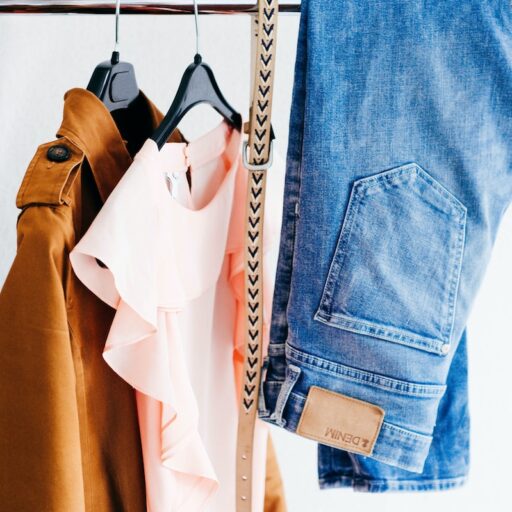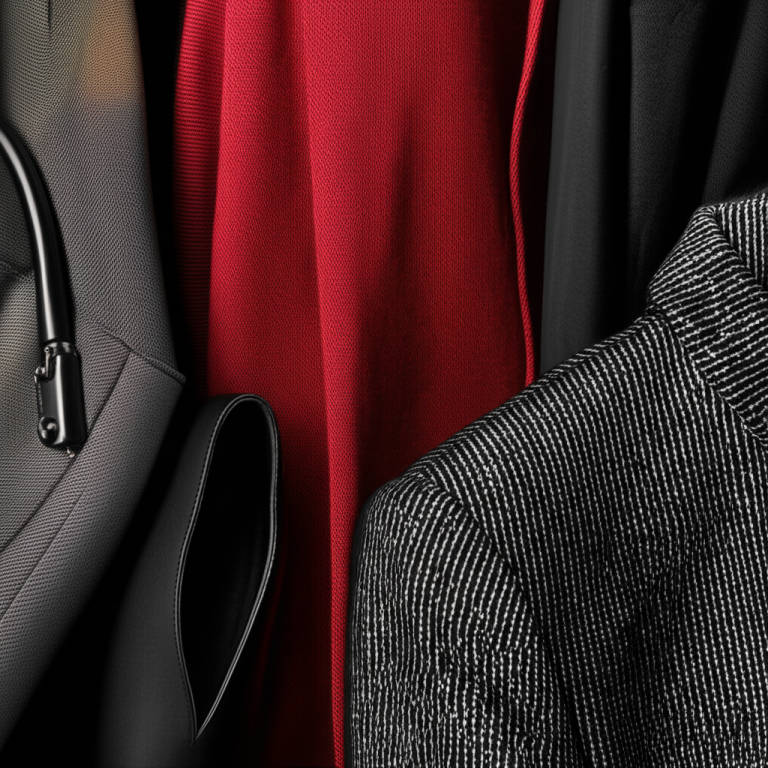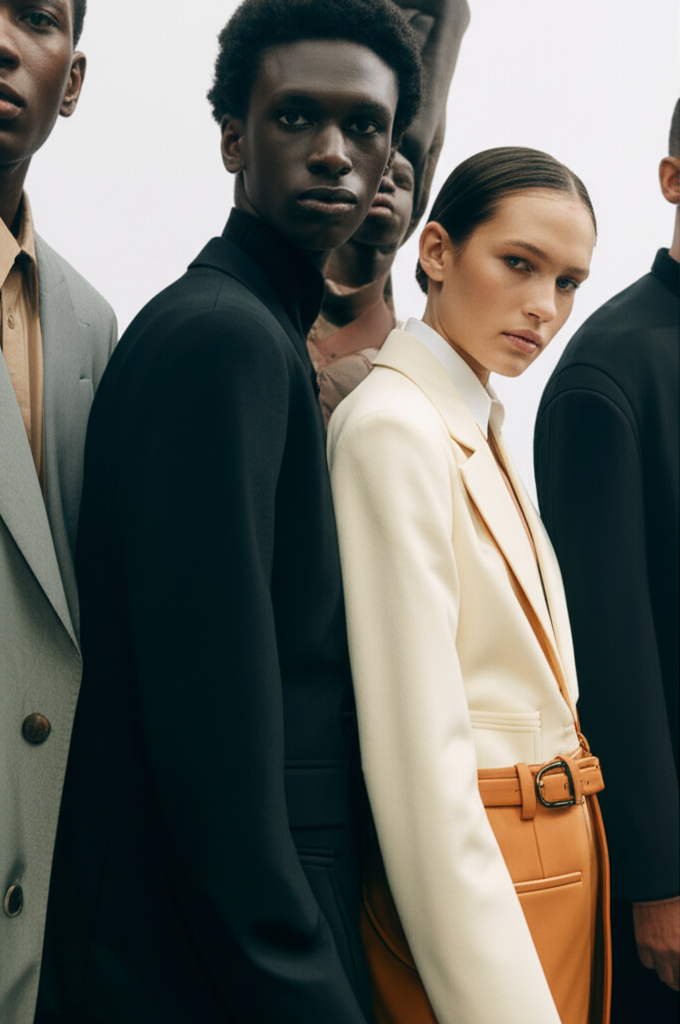Support our educational content for free when you purchase through links on our site. Learn more
Who is at the Top of the Fashion Industry? 10 Influential Brands in 2025 👗

In the dynamic world of fashion, the question of who reigns supreme is more than just a matter of brand recognition; it’s about influence, innovation, and cultural impact. As we dive into the top players in the fashion industry, you’ll discover how iconic brands like Chanel, Louis Vuitton, and Gucci have not only shaped trends but also redefined luxury in the modern age. Did you know that the luxury fashion market is projected to reach a staggering $450 billion by 2025? This explosive growth highlights the importance of understanding who is driving the industry forward.
Join us as we explore the titans of fashion, their unique contributions, and what makes them stand out in a crowded marketplace. Whether you’re a fashion enthusiast or someone looking to invest in timeless pieces, this article will provide you with insights and recommendations that are sure to elevate your style game.
Key Takeaways
- Top Brands: The fashion industry is dominated by brands like Chanel, Louis Vuitton, and Gucci, each with a unique legacy and influence.
- Cultural Impact: Fashion weeks and social media are pivotal in shaping trends and connecting brands with consumers.
- Sustainability Matters: More brands are focusing on sustainable practices, reflecting a growing consumer demand for ethical fashion.
- Diversity in Leadership: The push for diversity in fashion leadership is crucial for fostering innovation and cultural relevance.
Ready to elevate your wardrobe? 👉 Shop luxury fashion brands like Chanel | Louis Vuitton | Gucci and discover timeless pieces that reflect your style!
Table of Contents
- Quick Tips and Facts
- The Titans of Fashion: Who’s Leading the Industry?
- A Deep Dive into Fashion Powerhouses
- The Role of Fashion Weeks in Shaping Trends
- Influential Designers Who Changed the Game
- The Impact of Social Media on Fashion Leaders
- Sustainable Fashion: The New Frontier
- Luxury Brands vs. Fast Fashion: The Ongoing Battle
- The Future of Fashion: Trends to Watch
- The Importance of Diversity in Fashion Leadership
- Background: The Evolution of the Fashion Industry
- Conclusion
- Recommended Links
- FAQ
- Reference Links
Quick Tips and Facts
- Top Fashion Brands: The luxury fashion industry is led by brands like Chanel, Louis Vuitton, and Gucci. Each brand has its unique legacy and influence in the fashion world.
- Fashion Weeks: Major events like Paris Fashion Week and New York Fashion Week play a crucial role in setting trends and showcasing new collections.
- Sustainability: More brands are focusing on sustainable practices, with companies like Prada and Burberry leading the charge.
- Social Media Influence: Platforms like Instagram and TikTok have transformed how fashion brands connect with consumers, making influencers key players in the industry.
- Diversity Matters: The push for diversity in fashion leadership is gaining momentum, with more brands recognizing the importance of representation.
The Titans of Fashion: Who’s Leading the Industry?
When we talk about the top of the fashion industry, we can’t ignore the heavyweights that have shaped the landscape. Here’s a quick look at the top luxury fashion brands and their unique contributions:
| Brand | Legacy Highlights | Estimated Value |
|---|---|---|
| Chanel | Iconic designs like the little black dress and Chanel No. 5 | $13.2 billion |
| Louis Vuitton | Part of LVMH, known for luxury bags and streetwear | $32.6 billion |
| Gucci | Transformative designs and a favorite among millennials | $18.6 billion |
| Prada | Known for innovative materials and sustainable practices | $9.6 billion |
| Dior | Revolutionized fashion with the “New Look” collection | $7.5 billion |
These brands are not just about clothing; they represent cultural movements and luxury lifestyles.
A Deep Dive into Fashion Powerhouses
Let’s explore some of these fashion titans in detail:
Chanel: The Timeless Icon
- Design Philosophy: Founded by Coco Chanel, the brand revolutionized women’s fashion by introducing more comfortable and practical styles.
- Key Products: The Chanel No. 5 perfume and the 2.55 bag are timeless classics that continue to influence modern fashion.
Louis Vuitton: The Monogram Master
- Brand Strategy: Known for its iconic monogram, LV has diversified into streetwear and collaborates with contemporary artists, making it a favorite among younger consumers.
- Market Position: As part of the LVMH group, it has a robust portfolio that includes Dior and Fendi.
Gucci: The Trendsetter
- Cultural Impact: Under the creative direction of Alessandro Michele, Gucci has embraced bold designs and gender-fluid fashion, appealing to a younger demographic.
- Social Media Savvy: Their innovative marketing strategies have made them a hit on platforms like Instagram.
The Role of Fashion Weeks in Shaping Trends
Fashion weeks are the pulse of the industry! Events like Paris Fashion Week and New York Fashion Week set the stage for upcoming trends. Here’s how they influence the market:
- Trend Forecasting: Designers showcase their collections, giving buyers and consumers a glimpse of what’s to come.
- Networking Opportunities: These events are crucial for brands to connect with influencers, buyers, and media.
- Cultural Reflection: Fashion weeks often reflect societal changes and movements, making them a barometer for cultural shifts.
Influential Designers Who Changed the Game
The fashion industry is filled with visionary designers who have left an indelible mark. Here are a few who stand out:
- Coco Chanel: Pioneered women’s fashion with her innovative designs.
- Giorgio Armani: Known for his clean lines and luxurious fabrics, he revolutionized men’s fashion.
- Alexander McQueen: Famous for his avant-garde designs and theatrical runway shows.
The Impact of Social Media on Fashion Leaders
Social media has transformed the fashion landscape, allowing brands to connect directly with consumers. Here’s how:
- Influencer Marketing: Brands collaborate with influencers to reach wider audiences. For example, Dior has successfully leveraged influencers to promote their collections.
- Real-Time Feedback: Brands can gauge consumer reactions instantly, allowing for quicker adjustments to collections.
- Community Building: Platforms like Instagram foster a sense of community among fashion enthusiasts, making them feel part of the brand’s journey.
Sustainable Fashion: The New Frontier
Sustainability is no longer just a buzzword; it’s a movement! Brands like Prada and Burberry are leading the charge towards eco-friendly practices. Here’s what you need to know:
- Sustainable Materials: Many brands are now using recycled materials and sustainable fabrics in their collections.
- Transparency: Consumers are demanding transparency about where and how their clothes are made, pushing brands to adopt ethical practices.
- Circular Fashion: The concept of recycling and reusing fashion items is gaining traction, with brands encouraging consumers to return old items for recycling.
Luxury Brands vs. Fast Fashion: The Ongoing Battle
The clash between luxury brands and fast fashion is heating up! Here’s a breakdown:
| Aspect | Luxury Brands | Fast Fashion |
|---|---|---|
| Quality | High-quality materials | Lower-quality, mass-produced items |
| Price Point | Premium pricing | Affordable, accessible prices |
| Sustainability | Increasing focus on ethics | Often criticized for waste |
| Trends | Seasonal, exclusive collections | Rapidly changing, trend-driven |
Luxury brands focus on quality and exclusivity, while fast fashion prioritizes speed and affordability. The consumer’s choice often reflects their values and lifestyle.
The Future of Fashion: Trends to Watch
As we look ahead, several trends are shaping the future of fashion:
- Digital Fashion: Virtual clothing and digital fashion shows are becoming more prevalent, especially in the age of social media.
- Inclusivity: Brands are increasingly embracing diversity in their campaigns and collections, reflecting a broader range of body types and identities.
- Tech Integration: Wearable technology is merging with fashion, creating innovative products that enhance the consumer experience.
The Importance of Diversity in Fashion Leadership
Diversity in fashion leadership is crucial for fostering innovation and creativity. Here’s why:
- Broader Perspectives: Diverse leadership teams bring different viewpoints, leading to more innovative designs and marketing strategies.
- Consumer Connection: Brands that reflect the diversity of their consumer base are more likely to resonate with their audience.
- Cultural Relevance: Embracing diversity helps brands stay culturally relevant and socially responsible.
Background: The Evolution of the Fashion Industry
The fashion industry has undergone significant changes over the decades. From the haute couture of the early 20th century to the rise of streetwear, the evolution reflects broader societal shifts. Key milestones include:
- 1920s: The introduction of modern women’s fashion by designers like Chanel.
- 1960s: The rise of youth culture and the birth of ready-to-wear.
- 2000s: The explosion of fast fashion brands like Zara and H&M.
Fashion is a living, breathing entity that evolves with society, culture, and technology.
Conclusion
The fashion industry is a dynamic landscape filled with creativity, innovation, and cultural significance. From the luxury giants like Chanel and Louis Vuitton to the rise of sustainable practices, the industry is constantly evolving. As consumers, we have the power to shape its future by supporting brands that align with our values.
Recommended Links
- Who Dominates the Clothing Industry?
- Clothing Brand Guides
- Fashion Brand History
- Brand Manufacturing Practices
- Brand Quality Comparisons
- Emerging Clothing Brands
FAQ
Q: What defines a luxury fashion brand?
A: Luxury fashion brands are characterized by high-quality materials, exclusivity, and a strong brand heritage.
Q: How do fashion weeks influence trends?
A: Fashion weeks showcase new collections, allowing designers to set trends and connect with buyers and media.
Q: Why is sustainability important in fashion?
A: Sustainability addresses environmental concerns and promotes ethical practices in the industry.
Reference Links
Conclusion
In the ever-evolving world of fashion, the top brands and designers continue to shape our cultural landscape, pushing boundaries and redefining style. From the timeless elegance of Chanel to the innovative spirit of Gucci, these industry titans not only create beautiful clothing but also set trends that resonate with consumers around the globe.
As we’ve explored, the luxury fashion industry is marked by its commitment to quality, creativity, and sustainability. The rise of social media and the push for diversity are reshaping how brands connect with their audiences, making it an exciting time to be involved in fashion.
In summary, the positives of engaging with these leading fashion brands include access to high-quality, innovative designs that often reflect cultural movements. However, the challenges of navigating fast fashion and sustainability remain critical issues for consumers to consider.
We confidently recommend supporting brands that prioritize ethical practices and sustainability, as they are paving the way for a more responsible fashion industry. So, whether you’re looking to invest in a classic piece from Dior or explore the latest trends from Prada, remember that your choices can influence the future of fashion!
Recommended Links
- 👉 Shop Chanel on: Amazon | Chanel Official Website
- 👉 Shop Louis Vuitton on: Amazon | Louis Vuitton Official Website
- 👉 Shop Gucci on: Amazon | Gucci Official Website
- 👉 Shop Prada on: Amazon | Prada Official Website
- Books on Fashion: Fashion: The Definitive Visual Guide | The Fashion Book
FAQ
Who are the most influential fashion designers today?
Fashion is constantly evolving, but several designers have made a significant impact recently. Virgil Abloh (Off-White, Louis Vuitton), Alessandro Michele (Gucci), and Raf Simons (Calvin Klein, Prada) are among the most influential. Their unique visions and ability to blend streetwear with high fashion have resonated with younger audiences, making them pivotal figures in today’s fashion landscape.
Which fashion brands are currently leading the industry?
The leading brands in the fashion industry include Chanel, Louis Vuitton, Gucci, Dior, and Prada. These brands are not only financially successful but also culturally relevant, often setting trends that influence the broader market. Their commitment to quality and innovation keeps them at the forefront of the industry.
Who are the top fashion CEOs and executives?
Some of the top executives in the fashion industry include Bernard Arnault (LVMH), Marco Bizzarri (Gucci), and Emmanuel Gintzburger (Chanel). These leaders are instrumental in driving their brands’ strategies and navigating the complexities of the global fashion market.
What are the most prestigious fashion schools and their notable alumni?
Prestigious fashion schools include the Fashion Institute of Technology (FIT), Parsons School of Design, and Central Saint Martins. Notable alumni include Calvin Klein, Marc Jacobs, and Alexander Wang, who have all made significant contributions to the fashion industry.
How do fashion influencers impact the industry’s top players?
Fashion influencers play a crucial role in shaping consumer perceptions and trends. They have the power to elevate brands through social media, creating buzz and driving sales. Brands often collaborate with influencers to reach wider audiences, making them key players in marketing strategies.



